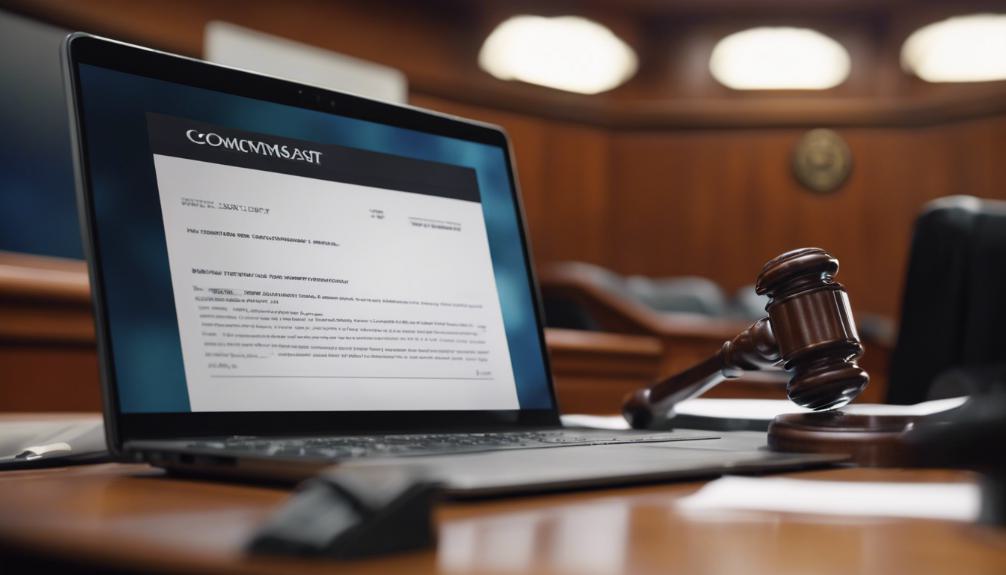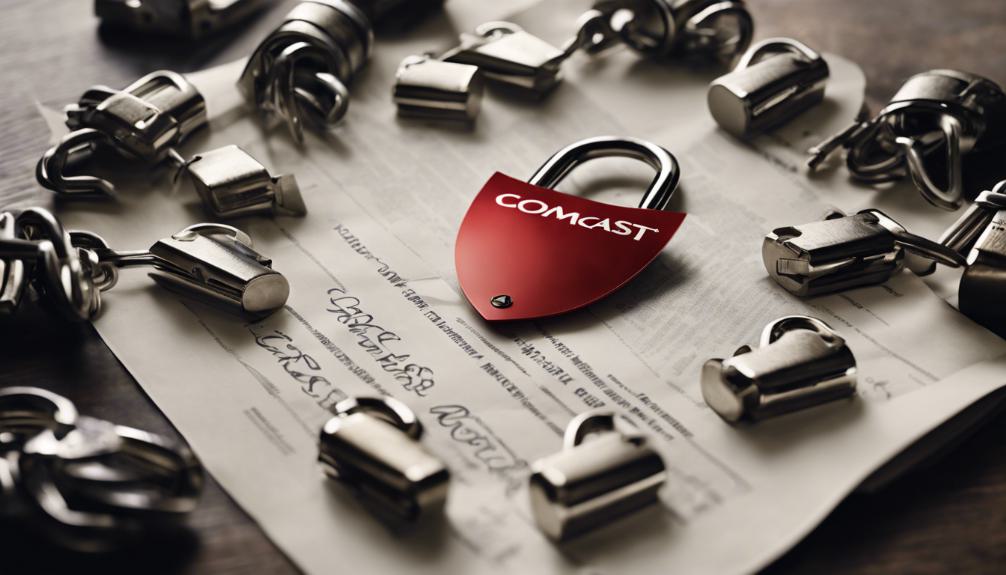Comcast Hit by Massive Data Breach Lawsuit
The recent lawsuit against Comcast, stemming from a substantial data breach impacting over 35 million Xfinity customers, marks a critical juncture in the ongoing dialogue about cybersecurity within major corporations. The breach, attributed to a vulnerability in a third-party software, raises probing questions about the adequacy of Comcast's security measures and the broader implications for the telecommunications industry. As the legal proceedings unfold, this case may set a precedent for how companies are held accountable for protecting sensitive customer information. The outcome could influence not only Comcast's practices but also how cybersecurity protocols are implemented across the sector, offering a compelling reason to follow the developments closely.

Key Takeaways
- Over 35 million Xfinity customers' data was compromised due to a vulnerability exploitation.
- Plaintiffs allege Comcast's security measures were insufficient, leading to the breach.
- Affected customers face risks of identity theft and unauthorized access to personal information.
- A lawsuit has been filed, seeking class action status, against Comcast for failing to protect customer data adequately.
Breach Overview

In mid-December, Comcast disclosed a significant data breach resulting from the exploitation of a Citrix product vulnerability, impacting over 35 million Xfinity customers by exposing their usernames, passwords, and personal details. The breach, occurring between October 16 and 19, leveraged a known flaw in Citrix systems to gain unauthorized access to Comcast's network. This incident highlights the critical importance of cybersecurity vigilance and the potential consequences of vulnerabilities within widely used enterprise solutions. The exploitation of such a vulnerability underscores the necessity for corporations to continuously monitor and update their security measures to protect against emerging threats. Additionally, it serves as a stark reminder of the interconnected nature of modern digital infrastructure and the cascading effects a single point of failure can have on vast numbers of individuals.
Customer Impact

Understanding the breach's technicalities underscores the profound effects on Xfinity customers, whose personal information was compromised in the incident. Over 35 million customers faced the unsettling reality that their usernames, passwords, and personal details were stolen between October 16 and 19, due to a vulnerability in a Citrix product. This breach has not only exposed them to the risk of identity theft but also to the potential of being targeted by criminals who might use their information for nefarious purposes. The stolen data, likely to be sold on the dark web, increases the risk of affected customers encountering unauthorized access to their personal information, thereby incurring costs and emotional distress in efforts to mitigate the risks of identity theft.
Security Lapses

The lawsuit filed against Comcast highlights significant security lapses, alleging that the company did not implement adequate measures to protect customer data from cyber threats. According to the plaintiffs, Comcast's failure to encrypt sensitive data and properly vet its IT vendors left its systems vulnerable to exploitation. This oversight is particularly concerning given the sophistication and frequency of cyberattacks in today's digital landscape. The breach, which compromised the personal information of over 35 million Xfinity customers, serves as a stark reminder of the potential consequences of neglecting cybersecurity practices. Experts in the field have criticized the telecom sector for not anticipating such risks, underscoring the need for robust security protocols to safeguard against future incidents.
Legal Allegations

Legal allegations against Comcast have surged, centering on claims of inadequate cybersecurity measures that purportedly left millions of Xfinity customers' data vulnerable to theft. The lawsuit, initiated by plaintiffs Hammond and Charles, underscores a significant lapse in Comcast's responsibility to safeguard user information. Accusations include Comcast's failure to encrypt sensitive customer data adequately, insufficient vetting of IT vendors, and a general lack of preparedness for potential cyberattacks. These allegations highlight not just a breach of trust between the telecommunications giant and its customers but also expose systemic vulnerabilities within the sector as flagged by cybersecurity experts. The legal challenge seeks to hold Comcast accountable for these purported oversights, emphasizing the need for robust security protocols to prevent future breaches.
Customer Risks

Affected Xfinity customers face significant risks due to the stolen data, potentially leading to identity theft and unauthorized access to personal information. The breach, impacting over 35 million individuals, involved sensitive details such as usernames, passwords, and other personal data. Such exposure makes customers vulnerable to a myriad of cyber threats. Criminals could exploit this stolen information to construct 'Fullz' packages, detailed profiles used in identity theft and fraud. Additionally, the data could be sold on the dark web, increasing the risk of targeted scams and unauthorized transactions. Victims might incur financial and emotional distress as they navigate measures to mitigate the risks of identity theft, including monitoring their credit reports and securing their online accounts against further unauthorized access.
Lawsuit Details

Recognizing the severe implications of the data breach, plaintiffs Hammond and Charles have initiated a lawsuit against Comcast, alleging negligence in safeguarding customer data. The breach, which affected over 35 million Xfinity customers, leveraged a vulnerability in Citrix products, leading to the theft of usernames, passwords, and personal details. Filed in the U.S. District Court for the Southern District of Florida, the lawsuit accuses Comcast of failing to implement adequate security measures, including the encryption of sensitive data and proper vetting of IT vendors. By highlighting these deficiencies, the plaintiffs argue that Comcast did not sufficiently anticipate or mitigate the risks of cyberattacks, leaving customer information vulnerable to theft and exploitation on the dark web.
Class Action Criteria

To qualify for participation in the class action lawsuit against Comcast, individuals must meet specific criteria outlined by the legal team. First, affected parties must be among the over 35 million Xfinity customers whose personal information, including usernames, passwords, and other sensitive details, were compromised as a result of the data breach occurring between October 16 and 19. Second, potential class members should have received notification from Comcast about their data being impacted by this incident. The legal framework for the class action emphasizes the need for claimants to have suffered or be at risk of suffering from the direct consequences of the breach, such as identity theft, unauthorized access to personal information, or other related damages.
Remedial Steps

In response to the Comcast data breach, several remedial steps were recommended, including the urgent need for customers to reset their passwords and enable two-factor authentication. These initial measures aimed to secure customer accounts from immediate threats. Additionally, Comcast was advised to conduct a thorough security audit to identify and rectify any existing vulnerabilities. Customers were also encouraged to monitor their accounts for unusual activity and report any suspicious occurrences promptly to Comcast and relevant authorities. In addition, Comcast offered free credit monitoring services to affected customers to help guard against potential identity theft. These steps, while reactive, were essential in mitigating the immediate risks posed by the breach and restoring customer confidence.
Security Recommendations

Following the Comcast data breach, it is important for both the organization and its customers to implement thorough security measures to safeguard against future cyber threats. For Comcast, enhancing security protocols is essential. This includes the encryption of sensitive data, rigorous vetting of IT vendors, and the implementation of advanced threat detection systems. Additionally, regular security audits and updates to cybersecurity infrastructure can preempt potential vulnerabilities. For the broader industry, sharing knowledge about cyber threats and collaborating on best practices can help fortify defenses against similar incidents. These steps are not just about responding to the current breach but are vital in building resilience against the evolving landscape of cyber threats, ensuring the protection of customer data and maintaining trust in digital services.
Consumer Responsibilities

While organizations like Comcast must fortify their defenses against cyber threats, it is equally important for consumers to understand their role in protecting their personal information. In the wake of the recent breach affecting over 35 million Xfinity customers, individuals must take proactive steps to secure their digital footprint. This includes regularly updating passwords, utilizing two-factor authentication, and remaining vigilant for suspicious activities on their accounts. Additionally, consumers should educate themselves on the risks associated with data breaches, such as identity theft and unauthorized access to personal information. By taking these measures, individuals can greatly mitigate the potential impact of a data breach on their personal and financial well-being, complementing the security efforts of corporations like Comcast.
Frequently Asked Questions
How Does This Data Breach Compare in Scale and Severity to Previous Data Breaches in the Telecommunications Industry?
The breach impacting over 35 million Xfinity customers is significant within the telecommunications industry, characterized by the extensive loss of personal information and highlighting critical vulnerabilities in security measures compared to previous incidents.
What Specific Actions Can Individuals Take Beyond the Recommended Security Measures to Protect Themselves From Similar Breaches in the Future?
Individuals can enhance their digital security by regularly monitoring financial statements, using unique passwords for different accounts, adopting secure communication tools, and staying informed about the latest cybersecurity threats and prevention techniques to guard against future breaches.
Are There Any Known Cases Where Stolen Data From This Breach Has Already Been Used for Malicious Purposes?
There are currently no specific reports indicating that the data compromised in the breach has been utilized for malicious purposes. Affected individuals should remain vigilant for potential misuse of their personal information.
How Will Comcast's Brand Reputation and Customer Trust Be Affected Long-Term by This Lawsuit and the Data Breach?
The long-term impact on Comcast's brand reputation and customer trust may be significant, as the breach and subsequent lawsuit highlight vulnerabilities in data security, potentially eroding consumer confidence and prompting scrutiny of their cybersecurity practices.
What Are the Potential Implications for the Telecommunications Industry's Regulatory Environment in Response to This Breach?
The telecommunications industry may face stricter regulatory scrutiny and enhanced security mandates to prevent future breaches, potentially leading to significant changes in how companies manage and protect customer data to avoid similar incidents.
Conclusion
To sum up, the Comcast data breach represents a critical reminder of the vulnerabilities inherent in digital infrastructures, particularly within the telecommunications sector. This incident, resulting from security lapses and inadequate protection of sensitive customer information, has led to significant legal repercussions and heightened concerns over personal data security. It underscores the necessity for stringent security protocols, rigorous vetting of IT vendors, and the proactive engagement of consumers in safeguarding personal information, thereby fostering a more secure digital ecosystem.

This post has been generated by AI and was not reviewed by editors. This is Not legal advice. Please consult with an attorney.




